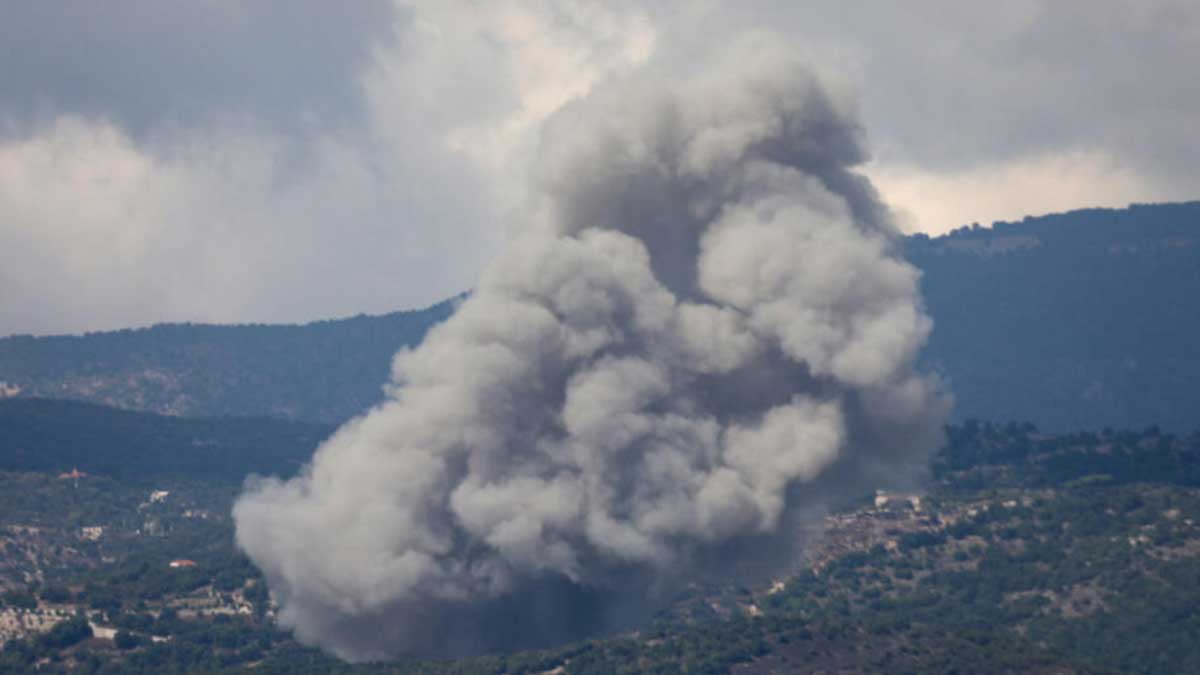- Home
- Billionaires
- Investing Newsletters
- 193CC 1000
- Article Layout 2
- Article Layout 3
- Article Layout 4
- Article Layout 5
- Article Layout 6
- Article Layout 7
- Article Layout 8
- Article Layout 9
- Article Layout 10
- Article Layout 11
- Article Layout 12
- Article Layout 13
- Article Layout 14
- Article Sidebar
- Post Format
- pages
- Archive Layouts
- Post Gallery
- Post Video Background
- Post Review
- Sponsored Post
- Leadership
- Business
- Money
- Small Business
- Innovation
- Shop
Recent Posts
Israel Hits Hezbollah Again as Death Toll Rises to 37

The Israeli military announced on Saturday that it had conducted further strikes against Hezbollah positions in southern Lebanon, intensifying the ongoing conflict between the Israel Defense Forces (IDF) and the militant group. This escalation has occurred against a backdrop of increasing casualties, with reports indicating that the death toll in Lebanon has now reached 37.
According to various news outlets, the situation in southern Lebanon remains volatile, with airstrikes targeting Hezbollah locations becoming more frequent. The New York Times highlighted that the latest strikes are part of Israel’s broader military campaign aimed at countering Hezbollah’s activities in the region. The strikes come amid fears of a potential full-scale war between Israel and Hezbollah.
In response to the Israeli assaults, Hezbollah launched an extensive barrage of over 60 rockets into northern Israel on Saturday afternoon. The Jerusalem Post reported that these rockets landed across various locations, igniting multiple fires and escalating tensions further in the region.
A significant strike on Friday targeted a site in southern Beirut, contributing to the rising death toll. Rescue teams are still working tirelessly to locate individuals trapped under the rubble, as reported by The Washington Post, which cited information from Lebanon’s health ministry. This attack followed a series of explosive incidents involving pager and radio devices throughout the week, which have been linked to Hezbollah’s infrastructure. Israel has not publicly acknowledged responsibility for these electronic detonations.
The situation intensified further with the targeted killing of senior Hezbollah figure Ibrahim Aqil in one of Israel’s strikes on Friday. Aqil has been implicated in terrorist attacks against U.S. interests in the 1980s, including the devastating bombings of the U.S. Embassy in Beirut and a Marine Corps barracks, which resulted in the deaths of hundreds of Americans. The U.S. had previously placed a $7 million bounty on Aqil, indicating the significance of his role in past attacks.
Meanwhile, Israel’s military operations are not confined to Lebanon. The ongoing assault on Gaza continues, with reports of an Israeli airstrike hitting a school that had been converted into a shelter, resulting in the deaths of 22 individuals, including many women and children. This incident has drawn widespread condemnation, with the Washington Post quoting Gaza’s civil defense department. In its defense, the Israeli military stated that it took “numerous steps” to prevent civilian casualties and attributed the use of civilian structures in Gaza to Hamas.
The ongoing Israeli actions in Lebanon raise concerns about the potential for a larger regional conflict. The White House has expressed apprehension that the U.S. and Iran, which supports Hezbollah, could become involved in an expanded confrontation. National Security Council spokesperson John Kirby emphasized that the U.S. was not participating in the strikes in Lebanon and called for a diplomatic resolution to the escalating situation.
The strikes against Hezbollah appear to be retaliation for the group’s recent attacks along Israel’s northern border, which escalated following the outbreak of hostilities between Israel and Hamas. Reports suggest that Israel has been involved in a covert campaign to disrupt Hezbollah’s communications and operations, including the controversial use of explosives in devices purchased by the group.
In summary, the situation in Lebanon and Israel continues to deteriorate, with increasing military actions from both sides and a significant rise in civilian casualties. The international community is watching closely, with concerns that the conflict could spill over into a broader war involving regional powers. As rescue efforts continue and military strikes escalate, the need for a diplomatic solution becomes ever more urgent to prevent further loss of life and potential regional instability.
Recent Posts
Categories
- 193 Countries Consortium Partner1
- 193cc Digital Assets2
- 5G1
- Aerospace & Defense48
- AI37
- Arts3
- Banking & Insurance11
- Big Data3
- Billionaires1,467
- Boats & Planes1
- Business332
- Careers13
- Cars & Bikes79
- CEO Network1
- CFO Network17
- CHRO Network1
- CIO Network1
- Cloud10
- CMO Network18
- Commercial Real Estate7
- Consultant1
- Consumer Tech194
- CxO1
- Cybersecurity73
- Dining1
- Diversity, Equity & Inclusion4
- Education7
- Energy8
- Enterprise Tech29
- Events11
- Fintech1
- Food & Drink2
- Franchises1
- Freelance1
- Future Of Work2
- Games149
- GIG1
- Healthcare79
- Hollywood & Entertainment203
- Houses1
- India’s 1000 Richest1
- Innovation46
- Investing2
- Investing Newsletters4
- Leadership65
- Lifestyle11
- Manufacturing1
- Markets20
- Media327
- Mobile phone1
- Money13
- Personal Finance2
- Policy569
- Real Estate1
- Research6
- Retail1
- Retirement1
- Small Business1
- SportsMoney42
- Style & Beauty1
- Success Income1
- Taxes2
- Travel10
- Uncategorized14
- Vices1
- Watches & Jewelry2
- world's billionaires1,436
- Worlds Richest Self-Made Women2
Related Articles
South Korea Plane Crash: A Tragic Loss and Global Mourning
The tragic plane crash at South Korea’s Muan International Airport on Sunday...
By 193cc Agency CouncilDecember 30, 2024H-1B Visa Debate Splits Trump Allies and Silicon Valley
The debate over H-1B visas has once again become a contentious issue,...
By 193cc Agency CouncilDecember 28, 2024Trump Moves $4B Stake in Truth Social Parent, Stock Drops 6%
Donald Trump recently transferred his 57% stake in Trump Media & Technology...
By 193cc Agency CouncilDecember 20, 2024House Rejects Trump-Backed Funding Bill, Shutdown Looms
The U.S. House of Representatives rejected a new government funding bill on...
By 193cc Agency CouncilDecember 20, 2024















Leave a comment